

I’ve always cringed when I hear someone say, “Love the sinner but hate the sin.”
In the end, I don’t quite know how to do that. I get the sentiment, and I think it basically comes from a well-intentioned place. Essentially, when someone says this, I think they’re trying to be kind and caring for the person above and beyond any kind of vice or sinful deeds that person has committed. You know: Man, I really love Steve but I hate his alcohol addiction. Deborah is a wonderful friend but her tendency to gossip is really not so wonderful. James has a heart of gold but I just can’t condone his adultery.
We love and affirm people but we don’t affirm the things they do that hurt themselves, others, or are an affront to God’s dream for them and their God-given potential.
But sin is not just the things we do (or do not do — there are both sins of commission and omission). Sin is something we can’t quite shake. While we’re first created good, as Desmond Tutu has reminded us, we certainly fall short (always be sure to remember Genesis 1:31 as the first word and Genesis 3 as the second).
Sin is a reality of our brokenness this side of Jesus’s return and that fully realized realm of God where there will be shalom and no one will hunger or cry anymore. Sin isn’t the way it’s supposed to be. So many want to make it out to be a laundry list of "don’ts" along life’s way — our faith, in the end, teaches us that it’s so much more than that.
I reject the whole notion of love the sinner but hate the sin — it misses the Gospel point that we are more than our inadequacies or things that we’ve done or not done that have missed the mark. We are better than our sin — we are created in the beautiful image of God.

I am in over my heart on the LGBTQ situation within the church. As a Christian ethicist, life-long evangelical, and devoted Christ-follower, my heart aches to the point where it’s breaking. I have friends, students, and family who are gay or lesbian, and my faith in Christ would be worse off without them. Among other things, they witness faithfulness to God amidst exclusion and persecution.
Fortunately, I’m in a church where being in over your heart is a good thing. Now called the Evangelical Covenant Church, my denomination’s founders called themselves Mission Friends at the outset. We began as a renewal group in Sweden around the practices of reading Scripture and hospitality. We began out of a love for spiritual formation, and we countered the dominant culture by allowing all people to be readers of Scripture.
Scripture reading in rural Sweden developed as a subversive practice. Though they were few and poor, lowly and insignificant, our Covenant forebears enacted justice by crossing prohibitive lines of class, gender, and age. Three things sustained them: the Jesus of the word; a new spirit of freedom and joy; and the word of God and the sacraments. As a result, these faithful groups gained the capacity to hear God’s word through the hearts and minds of individuals who differed from one another.
This practice of diverse interpretation amongst lay people forged ahead through the strength of friendships. The name “Mission Friends” grew under the Psalm 119 banner, “I am a friend of all who fear thee,” and the people of the movement treasured friendship and unity in Christ above any doctrinal or confessional statements. They believed that friendship is not only the method of advancing the gospel — it is the heart of the gospel. Friendship reflects in the simplest terms the way that the Evangelical Covenant church does ecclesiology, or life together.

On the night I came out, my mom didn’t sleep. She stayed up all night long, crying and praying to God, begging God that what I had said wasn’t true, and if it was, for God to show her some way forward. She waited desperately for a divine word to fall upon her like manna. When it didn’t, when the morning light came and her world was still warped, she got out of bed to go searching for her Lord. She figured God would be at the Christian bookstore.
She worked the aisles for an hour, flipping through books, setting them down, moving from one section to the next. When she found nothing remotely related to this, she started to panic. A store employee passed behind her and she grabbed her arm — asked her where the books on homosexuality were.
The girl gave her a puzzled look and then said:
“Oh. I’m sorry. But we don’t carry books like that here.”
My mom’s eyes blurred with tears. She nodded.
“You’ve got to be kidding me.” She muttered as the girl walked away.
“You’ve got to be kidding.”
On the drive back, she heard the girls’ answer twist and reshape in her mind:
Mothers like you with sons like that don’t belong here.
~
This past weekend, my mom and I recalled those early days as we walked down the streets of Portland, Ore. We had just finished up the final session at the annual Gay Christian Network Conference, and as we walked to our hotel to pack up our things, we felt at the strange seam stitching us from there to here: From hopeless and alone, to three years later sitting palms-raised, on the receiving end of so much hope and blessing and life from a gathering of Jesus-crazy LGBTQ outsiders. Through all the mess along the way, we managed to press on together, as a family.
My first real participation with the tension that exists between the LGBTQ community and the church came when I was a freshman at Penn State University in the spring of 1996. As is the case on many campuses, there was a preacher who would stand outside one of the campus buildings on the green and preach sermons to students. Because he stood outside the Willard Building, he was ‘affectionately’ referred to as the 'Willard preacher.' One spring day, there was a large National Coming Out Day Rally scheduled to happen on campus on the steps of the theater that sat just opposite the Willard Building. When I walked out of my calculus class that day, I had no idea that I would be walking right into the middle of a real live demonstration of the tensions that existed between LGBTQ people and the church. On one set of steps stood a group of students and speakers calling on people to be true to who they were, to not be ashamed of their sexual orientation, and to be open and proud about it. On another set of steps, led by the Willard preacher, a group of students stood chanting, “Sodomy Is Perversion!”
I did not fully understand all that was going on in my heart that day, but I felt like I had to make a choice. One choice I could make was to join the chanters. Now, growing up I had been taught that God did not affirm homosexuality, but I did not feel good about the chanting and jeers that were happening, and I didn’t think I could do that. WWJD, right? I didn’t think this was it. A second choice I could make would be to join the gay pride group. It may seem like an easy choice, but at that time and at that point in my life, I felt that joining this group was a way of saying no to God. I was struggling in my faith, but was I ready to take this step away? I could not see a way that these two groups could peaceably co-exist, and I felt like my faith in Christ was on the line. In the end, I sat down with some friends in the gay pride group.
Fast forward to this past Saturday morning. This time the choice was easier for me. The Westboro Baptist Church had gathered with their signs in protest outside the Oregon Convention Center in Portland, Ore., where the Gay Christian Network was holding their annual conference. As an act of solidarity, support, and protection, Christians from around the Portland area gathered to build a ‘wall of love’ so that conference attenders could enter with little interference from the hateful rhetoric of the Westboro Baptist group.
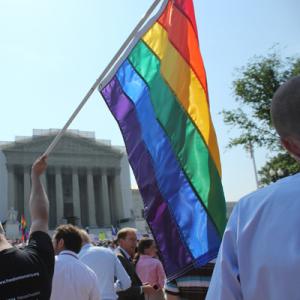
Ten years after Massachusetts became the first state to allow same-sex marriage, gay and lesbian Americans can be wed in 35 states and the District of Columbia (Florida will boost that number to 36, starting Jan. 6). This year, the Supreme Court may put an end to the skirmish by legalizing what progressives call “equality” and conservatives dub a “redefinition” of this cherished social institution.
The court last ruled on gay marriage in 2013 when the justices gutted much of the federal Defense of Marriage Act in United States v. Windsor and delivered a massive blow to anti-gay marriage advocates. Since then, the court has acted by not acting — in effect, doubling the number of states where gay marriage is legal, from 17 to 35, by refusing to hear a slew of appeals last year.
In November, the Cincinnati-based 6th U.S. Circuit Court of Appeals upheld gay marriage bans in four states, which will almost certainly require the high court to decide the issue once and for all.
Conservative Christians have been among the most ardent opponents of gay marriage and rights for decades. How will they respond if the Supreme Court makes gay marriage legal nationwide?
The answer, it turns out, depends on which Christian you’re speaking to.

Over the past year, I have seen a tremendous amount of reformation and renewal taking place in the American Christian community around the topic of LGBTQ acceptance and equality. Like with many other justice issues in the past, entire new movements are calling God’s people forward, deeper into realizing the Kingdom of God on earth as it is in Heaven. And though there is still a lot of work left to do, the changes I have seen over the past year have been nothing short of inspiring.
Two years ago, the conversation around LGBTQ equality in evangelical circles was limited to a few “liberal” organizations, which were viewed by evangelicals as marginally Christian. But in 2014 we have seen literally dozens of evangelical leaders and organizations appear on the scene, taking momentous leaps forward as they advocate for their LGBTQ brothers and sisters around the world.
By God’s grace, I have been able to witness much of this transformation first hand. Last fall, I began writing about LGBTQ equality on my blog Revangelical. Soon after, a few posts turned into a clear calling from God to be a voice of reformation on this issue from within evangelical Christianity. I felt compelled to speak up with all of my fellow LGBTQ brothers and sisters who have faced so much discrimination and oppression at the hands of those who call themselves “people of Good News.”

In the realm of biblical arguments in support of same-sex relationships, I’ve always found one — “Jesus never said anything about homosexuality” — to be particularly weak.
After all, Jesus also never said anything about rape, molestation, bestiality, torture, cyber-bullying, insurance fraud or elaborate pagan rituals involving self-mutilation and child sacrifice. That does not, by default, earn any of those things the Lord’s unconditional seal of approval.
What’s more, I’m not sure if the argument’s underlying premise is even true. Because, in the Gospels, Christ may indeed have failed to specifically broach the topic currently preoccupying the American Evangelical church, but he did address the subject, in a manner of speaking, in Matthew 22 and Mark 12.
In those two brief, but pivotal, passages of scripture, Jesus captures the essence of the Christian ethic, mission, calling and faith in an incredibly simple and beautiful way. And he did so, interestingly, not as a standalone teaching, but in answer to a question from his critics.
It starts when a group of Pharisees, taking the tag from the Sadducees — who had been silenced in the previous back-and-forth — descend on Jesus, with the goal of ripping open a can of good, old-fashioned pwnage, first-century style.
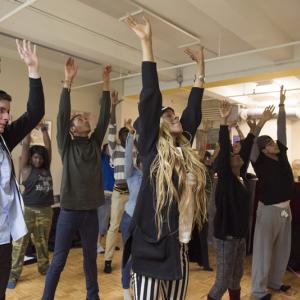
Jordyn Garrett left home so he could become Olivia. Lerato “Lee” Mokobe left South Africa to pursue her dreams, but can’t return because of the dangers her home life and culture posed to her identity. Sarah Silva left her home because of sexual abuse and unhealthy family relationships.
They’re not even old enough to rent a car, and yet they’re living homeless in New York City. But these and other young adults found themselves a family in the Reciprocity Foundation.
The Reciprocity Foundation is a nonprofit dedicated to helping the city’s homeless youth realize their full potential by developing their passions and reconnecting with their spiritual side. Many of the youth they work with are people of color or part of the LGBT community, and many come from religious backgrounds.
“Many (of these youth) feel negatively towards religion since it has contributed to their isolation from their family and/or homelessness,” said Taz Tagore, a Reciprocity co-founder.
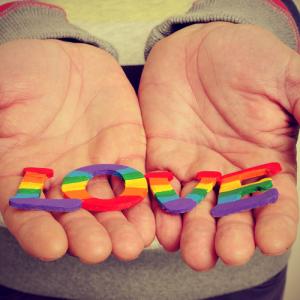
Editor's Note: In this new series, we explore the ongoing conversation within the church over LGBT identities, affirmation, and inclusion. As the push for equality expands, how are communities of faith participating and responding — and is it enough? We will be examining this at a deeper level in the January issue of Sojourners magazine, with a cover story from evangelical ethicist David Gushee. Subscribe Now to receive that issue.
During the opening worship service at the Reformation Project’s Washington, D.C., conference, a weekend of events promoting the biblical affirmation of the LGBT community, something seemed amiss. I looked around the church pews to find what fueled my unease. Maybe it was the guitar-charged praise music alongside traditional liturgy. Or maybe it was the older white man listening intently to the younger gay black woman. Evangelical vibrato next to mainline rigidity, old next to young, white next to black, gay next to straight next to bi next to transgendered.
It was a Galatians 3 kind of room — a reminder that in Jesus there is no longer “Jew or Greek, slave or free, male or female.” Gay or straight.
“For all of you are one in Christ Jesus.”
It was that sacred “oneness” that surprised me. Nothing was actually amiss — all things were new. There was a colorful rareness and a refreshing affirmation.
Rev. Allyson Robinson gave the opening address of the conference, offering prayer, Scripture, encouragement, and a few warnings for the LGBT-affirming church. The warnings came in the form of analogy in which she likened the temptations of Jesus in the desert to the temptations of the affirming church on the verge of a culture war victory.
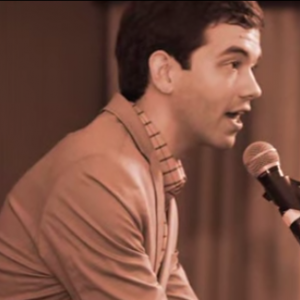
Matthew Vines took a leave of absence from his Harvard studies to explore what the Bible says about homosexuality. As a conservative evangelical Christian with a high view of scripture, Vines struggled to reconcile his identity as a gay man with the apparent teaching of the Bible. In his book God and the Gay Christian: The Biblical Case in Support of Same-Sex Relationships, Vines explains what he has learned about scripture and tells the story of his own pilgrimage of faith, fidelity, and family.
Read “My Dad’s Worst Day” (Sojourners, June 2014), an excerpt from Vine’s groundbreaking book. And be sure to watch this original SojoStory video, as Vines discusses his journey as a gay evangelical Christian who has immersed himself in seeking new and deeper understandings of what the Word has to say to us today on these profoundly important issues.
WATCH more below.
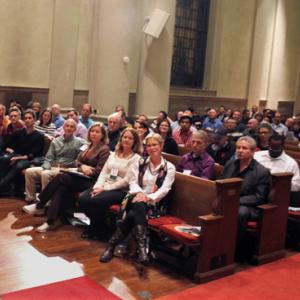
It used to be that defining an “evangelical” was pretty straightforward: some version of a “born-again” experience, a deep appreciation for the Bible as the written Word of God and a conviction to spread salvation to the masses.
Opposing homosexuality wasn’t part of that holy trinity, but for most evangelicals, it was more or less a given that all sexuality outside of man-woman marriage is sinful. Not so much anymore.
Growing cultural acceptance of homosexuality is leading many Christians to reconsider their historic opposition. As intractable as the debate itself can be, American evangelicals nonetheless are experiencing lively conflicts over maintaining boundaries. What can you believe about gays and still call yourself an evangelical? And who gets to decide?
In October, the Vatican’s Synod on the Family and a major conference of establishment evangelicals in Nashville both featured softer rhetoric on gays and lesbians while reaffirming the view that homosexuality is morally disordered.
Last week in Washington, however, a gay evangelical activist laid out a biblical argument for an affirming view.
Matthew Vines was raised in a conservative Presbyterian congregation in Wichita, Kan. Realizing and accepting that he was gay, Vines neither abandoned religion nor sought out a more affirming church. Instead, he delved deeply into the Bible and Christian teaching. He came away with the conviction that biblical Christianity could affirm same-sex relationships.